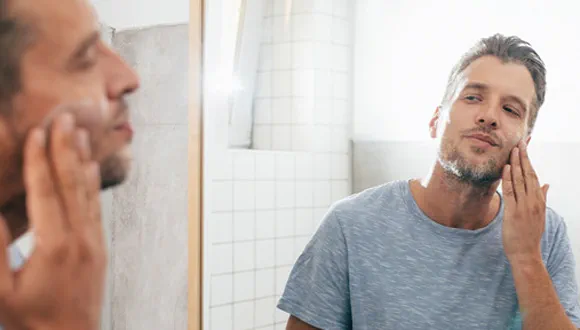Have you ever wondered why dermatologists and beauty experts always emphasize the importance of sunscreen in your skincare routine? While you may think of sunscreen as a product only needed for days at the beach or during outdoor activities, the truth is that it should be a daily essential for everyone.
Sunscreen protects your skin from harmful UV rays and is crucial in preventing premature aging, reducing the risk of skin cancer, and promoting overall skin health. So, let’s explore in depth why sunscreen should be a non-negotiable part of your daily skincare regimen.
UV Rays and Their Effects on Skin:

The sun emits two types of UV rays that can damage the skin: UVA and UVB. UVA rays can penetrate deep into the skin and cause premature aging, such as wrinkles, fine lines, and age spots. They can also cause skin cancer. UVB rays cause sunburn and can also lead to skin cancer. It is crucial to protect our skin from both types of UV rays.
Why Sunscreen is Essential:
Sunscreen is an essential component of any skincare routine. It can protect our skin from the harmful effects of UV rays. When we expose our skin to the sun without sunscreen, we disclose it to sunburn, premature aging, and skin cancer. Sunscreen can also help prevent dark spots, skin discoloration, and other signs of aging caused by the sun.
Also Read. How to Get Rid of Dark Circles Under Your Eyes – Simple and Effective Tips
Choosing the Right Sunscreen:
Choosing the right sunscreen can be challenging. When selecting a sunscreen, consider the following factors:
SPF:
SPF stands for Sun Protection Factor and measures how effectively sunscreen protects the skin against UVB rays, which are the main cause of sunburns. The higher the SPF, the more protection the sunscreen provides. Experts recommend sunscreen with an SPF of at least 30, which blocks about 97% of UVB rays.
However, it’s important to note that no sunscreen can provide 100% protection, and higher SPF values don’t necessarily mean significantly better protection. It’s also important to reapply sunscreen every two hours, even if it has a high SPF.
Broad-spectrum:
Broad-spectrum sunscreens protect against both UVA and UVB rays. UVA rays are responsible for skin aging and can cause skin cancer, while UVB rays cause sunburns and can lead to skin cancer.
Choosing a broad-spectrum sunscreen is essential to protect your skin against both UV rays. Look for ingredients like zinc oxide, titanium dioxide, avobenzone, and ecamsule, which provide broad-spectrum protection.
Water-resistant:
Water-resistant sunscreens are designed to stay on the skin longer, even when swimming or sweating. They protect against the sun’s harmful rays, even when exposed to water. However, it’s important to note that water-resistant sunscreen isn’t waterproof, and you’ll still need to reapply it every two hours or after swimming or sweating.
Look for the term “water-resistant” on the label, and check the instructions for how long the sunscreen will remain effective when exposed to water. The title may also indicate whether the product is water-resistant for 40 or 80 minutes.
Using Sunscreen Effectively:
To use sunscreen effectively, follow these tips:
Apply generously:
Applying sunscreen generously is important to ensure that your skin is properly protected. Apply enough sunscreen to cover all exposed skin areas, including your face, neck, ears, and any other areas exposed to the sun. Generally, you should use about one ounce of sunscreen (enough to fill a shot glass) to cover your entire body.
Reapply regularly:
Sunscreen should be reapplied every two hours or more frequently if you are sweating or swimming. Even water-resistant sunscreens can wear off over time, so it’s important to reapply regularly to protect your skin.
Apply before sun exposure:
Sunscreen should be applied at least 15 minutes before sun exposure to allow time for it to be absorbed by the skin. This will ensure that you are fully protected when you go outside.
Use with other protective measures:
While sunscreen is an important part of sun protection, it should be combined with other protective measures. Wear protective clothing, such as long-sleeved shirts and hats, to cover as much skin as possible. Stay in the shade during the hottest day, between 10 am and 4 pm. And don’t forget to wear sunglasses to protect your eyes from UV rays.
Sunscreen is essential to any skincare routine, as it helps protect our skin from the harmful effects of UV rays. When selecting a sunscreen, look for one SPF 30 or higher, broad-spectrum and water-resistant. Apply sunscreen generously, reapply regularly, and use it with other protective measures to protect your skin properly.
What is the two-finger rule for sunscreen?

The two-finger rule for sunscreen refers to a simple guideline to help you determine how much sunscreen to apply to your skin. According to this rule, you should use enough sunscreen to cover the exposed areas of your body using two fingers’ worth of the product.
Here’s how you can use the two-finger rule for sunscreen:
- Squeeze a generous amount of sunscreen onto the palm of your hand.
- Use two fingers to scoop up the product and apply it to your skin.
- Rub the sunscreen onto your skin using circular motions, covering all the exposed areas.
- Continue applying sunscreen until you have used enough to cover all the exposed skin using two fingers’ worth of the product.
The two-finger rule is a good starting point, but it’s important to note that the amount of sunscreen you need can vary depending on your body size, the amount of skin you’re covering, and the strength of the sunscreen you’re using. If you have fair skin or spend an extended period in the sun, you may need more sunscreen.
In general, it’s recommended that you use about an ounce (or a shot glass full) of sunscreen to cover your entire body. You should also reapply sunscreen frequently every two hours or more if you’re sweating or swimming.
Remember that using enough sunscreen and reapplying it regularly is key to protecting your skin from the harmful effects of the sun, such as sunburn, premature aging, and an increased risk of skin cancer.
Is skincare effective without sunscreen?
Skincare can be effective without sunscreen, but it depends on the specific goals and concerns of an individual’s skincare routine.
Skincare encompasses a wide range of products and practices that aim to improve the appearance and health of the skin. These can include cleansers, moisturizers, serums, exfoliants, and more. Each product targets a specific issue, such as acne, dryness, or wrinkles.
On the other hand, sunscreen is specifically designed to protect the skin from the harmful effects of the sun’s UV radiation. Sun damage is a major contributor to skin aging and can also increase the risk of skin cancer. Therefore, sunscreen is a crucial part of a skincare routine for anyone who wants to maintain healthy, youthful-looking skin.
That being said, not everyone needs sunscreen every day. For example, if you work indoors and don’t spend much time outside during the day, you may not need sunscreen daily. However, if you spend significant time outside, it’s important to protect your skin with sunscreen.
Additionally, there are other ways to protect your skin from the sun besides sunscreen. Protective clothing, such as hats and long-sleeved shirts, can provide protection. Staying in the shade and avoiding the sun during peak hours (usually between 10 am and 4 pm) can also help reduce exposure to UV radiation.
In summary, while sunscreen is an important part of a comprehensive skincare routine, it’s not always necessary for everyone. However, it’s important to be aware of the risks of sun damage and take steps to protect your skin accordingly.
What are the three most important skincare products?

Various skin care products are available, but three essential products should be included in everyone’s daily skincare routine. These three products are:
Cleanser:
A good quality cleanser is the foundation of any skincare routine. It helps remove dirt, oil, and impurities from the skin’s surface, allowing it to breathe and function properly. Cleansing also helps prepare the skin for other skincare products by creating a clean canvas for them to work their magic.
It is important to choose a cleanser that is appropriate for your skin type and concerns. For example, if you have dry skin, you may want to look for a gentle, moisturizing cleanser, while oily or acne-prone skin may benefit from a foaming or exfoliating cleanser.
Moisturizer:
Moisturizer is another crucial skincare product that helps to hydrate and protect the skin. It helps maintain the skin’s natural moisture balance and prevent dehydration, leading to dryness, flakiness, and premature aging.
A good moisturizer should contain ingredients that help to nourish and strengthen the skin barrier, such as ceramides, hyaluronic acid, and antioxidants. Like cleansers, choosing a moisturizer suitable for your skin type and concerns is important.
Sunscreen:
Sunscreen is perhaps the most important skincare product, as it helps to protect the skin from the damaging effects of the sun’s UV rays. Exposure to UV radiation can lead to various skin problems, including sunburn, premature aging, and an increased risk of skin cancer. A broad-spectrum sunscreen with an SPF of at least 30 should be applied daily, even on cloudy or overcast days. It is also important to reapply sunscreen every two hours or more frequently if you are swimming or sweating.
The three most important skincare products are cleansers, moisturizers, and sunscreen. By using these products regularly, you can help to maintain healthy, hydrated, and protected skin.
Conclusion:
In conclusion, sunscreen is an essential component of any skincare routine. It protects our skin from the harmful effects of UV rays, including sunburn, premature aging, and skin cancer. When selecting a sunscreen, choose one with a high SPF, broad-spectrum protection, and water resistance. Use sunscreen effectively, apply generously, reapply regularly, and use it with other protective measures. By following these tips, you can enjoy the sun while protecting your skin from harmful effects.
FAQs!
Is sunscreen the most important skincare step?
Sunscreen is essential to any skincare routine, as it helps protect your skin from harmful UV rays that can cause skin damage, premature aging, and even skin cancer. While there are other important steps in a skincare routine, such as cleansing and moisturizing, sunscreen is critical for maintaining healthy skin.
Is it important to put sunscreen on your face every day?
Applying sunscreen on your face daily, even if it’s cloudy outside or if you’re staying indoors, is highly recommended. UV rays can penetrate clouds and windows, and cumulative exposure can damage skin over time. A broad-spectrum sunscreen with an SPF of at least 30 can help protect your skin from UVA and UVB rays.
What is the benefit of sunscreen on the face?
The benefits of wearing sunscreen on your face are many. Sunscreen helps to prevent sunburn, skin aging, hyperpigmentation, and skin cancer. It can also help prevent the formation of fine lines, wrinkles, and dark spots, making your skin look older and less healthy over time. Additionally, regular sunscreen can help improve your skin’s overall health and appearance by protecting it from environmental damage.
Can I skip sunscreen in my skincare routine?
Skipping sunscreen in your skincare routine can harm your skin’s health, exposing it to harmful UV rays. Over time, this can lead to premature aging, skin damage, and even skin cancer. So it’s highly recommended to include sunscreen as a regular skincare routine to keep your skin healthy and protected.
